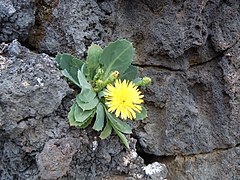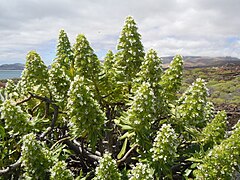Famara is the main mountainous massif in the north of the island of Lanzarote in the Canary Islands. It is the eastern slope of a volcano erupting in the Miocene. The cliffs of Famara (Risco de Famara) are the remains of a caldera of about ten kilometres in diameter centred on the south of La Graciosa.
The cliffs of Famara peak at an altitude of 671 m at the Peñas del Chache. A village at the range's seaside is Caleta de Famara, part of Teguise.
Playa de Famara

The beach south of the cliffs of Famara, the Playa de Famara, is one of sand and volcanic pebbles. It is two kilometres long. Its orientation towards the Atlantic Ocean makes it suitable for the practice of surfing.
A popular seaside resort, Caleta de Famara, has been built here. It is part of the Teguise municipality.
Environment
The coast north of Famara beach is closed by cliffs and inaccessible to vehicles. It is a remarkable biodiversity site, with about ten species of endemic plants at the site.
All the cliffs of Famara and its coastline are integrated into the natural park of the Chinijo Archipelago.
Endemic plants
There are about ten species of endemic plants on the coastal plain at the foot of the Famara cliffs. This endemism has been fostered by isolation dating back more than a million years.
Pollution

Exposed to currents from the west, Famara Beach is a site of waste accumulation from the North Atlantic garbage patch
References
- "The Volcanism in Lanzarote" (PDF). Sixth International Conference on Geomorphology. Archived from the original (PDF) on 2019-01-30. Retrieved 2019-01-29.
- Caleta de Famara Archived 2021-06-03 at the Wayback Machine (fr)
- Kunkel 1982.
Bibliography
- Kunkel, Günther W.H. (1982). Los Riscos de Famara (Lanzarote, Islas Canarias) : Breve descripción y guía florística. Naturalia Hispanica (in Spanish). Madrid: Instituto nacional para la conservacion de la naturaleza. p. 118.
External links
- Risco de Famara
- Geomorfología del Risco de Famara. Web oficial del Cabildo. Pag. 1 y 2 Archived 2015-09-23 at the Wayback Machine
- Playa de Famara. Ayto. de Teguise
29°07′34″N 13°31′34″W / 29.12622°N 13.52598°W / 29.12622; -13.52598
Categories:

